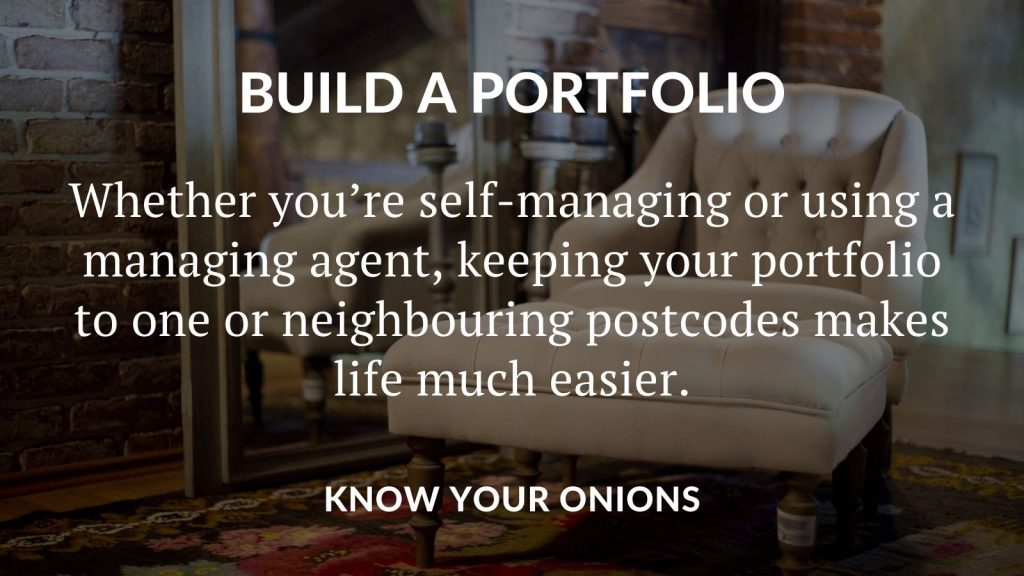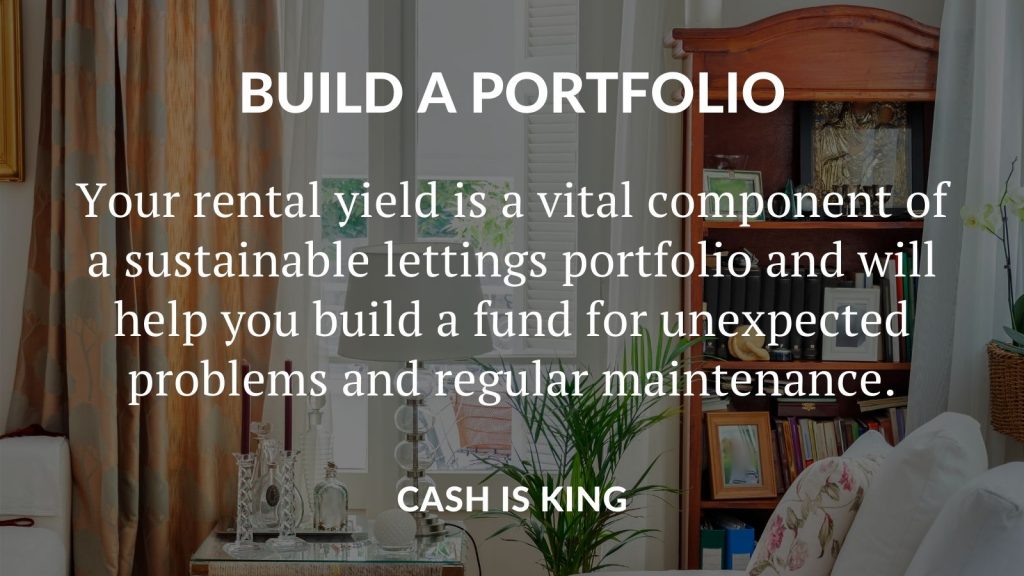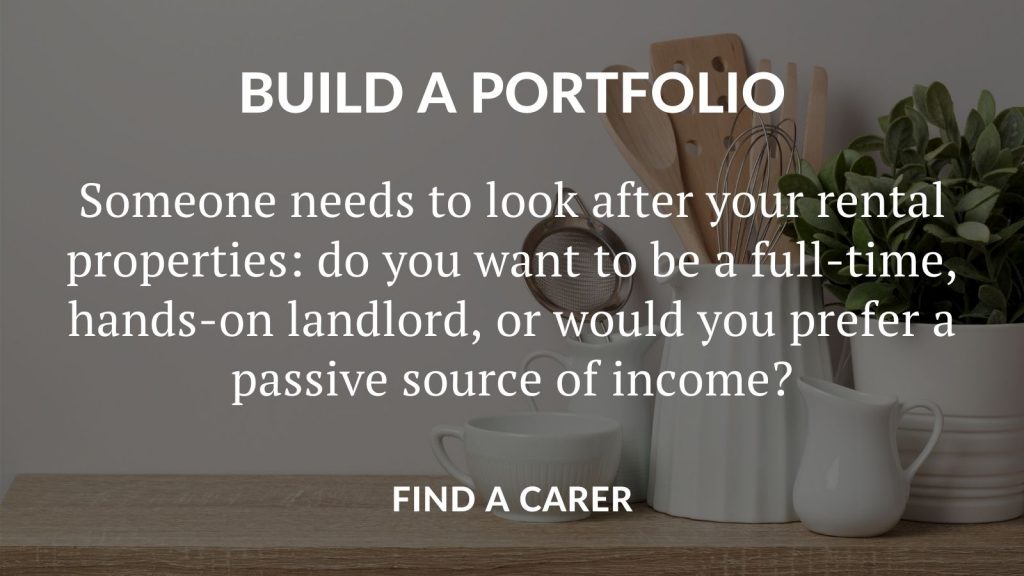PROFESSIONAL PRIDE: WHY BEING AN ESTATE AGENT IS A REAL PRIVILEGE

Have you ever listed all the things you love about your work? It’s an illuminating exercise in clarifying all the reasons you do what you do. For some people, it can even be the catalyst for a change of career.
The idea for this week’s blog came unexpectedly one Sunday when my mind drifted to how much I enjoy being someone’s estate agent. It didn’t immediately occur as a blog, but as the minutes went by, it seemed a shame to keep it all to myself, so this week’s article is more personal than most.
Moving home is a big deal for everyone: for you; for the people you’re buying from; and for whoever’s buying from you. But your move is also a big deal for me, so when it’s time for you to find an estate agent in County Louth, I’d love to hear about your plans. Call me for a chat on 042 933 2482 or email us at info@lavelles.ie whenever the time is right.
Meanwhile, I hope you enjoy the read.
HEARING PEOPLE’S STORIES
Everyone moves for a reason. The big ones include growing families, downsizing, a change of school, or relocating for work, while others are more particular and personal: housing an enormous collection (cars, records, art – you name it!); a change of scenery and lifestyle; wanting a workspace or creative studio at home.

Think about where you live right now. How did you come to be there? Even if you share any of the reasons above, your story will be entirely your own, and it’s fascinating to learn about people’s lives and where they hope to go: for themselves, for their families, and their futures.
Some moves are planned, others are unexpected, and a few are completely spontaneous. And while most moving tales are happy, they’re not always full of joy and helping people through all the highs and lows is a meaningful experience. Being there for those initial thoughts; putting a home on the market and finding a buyer; then through chains, conveyancing and completion: those are rich and deep relationships.
HELPING DREAMS COME TRUE
This might sound cheesy, but it’s a major part of being an estate agent: there’s so much riding on every move that you cannot be impervious. It can sometimes feel like having several families or households at once and being part of them all at the same time is nothing short of extraordinary.

If you’ve ever moved home, you’ll know how it heightens your nerves and emotions. Even with all the excitement about the future, the combination of uncertainty, unpredictability and upheaval is often mixed with specific timeframes and urgencies: it’s not the greatest recipe for staying relaxed.
There are lots of what-ifs, so there’s plenty of putting minds to rest and giving people comfort. There’s rarely a sale without even a minor bump in the road, and estate agents are on the frontline: when there’s a wobble, we’re usually the ones who have to deliver the news.
But we can also be the reason that sales go through; sometimes by solving real problems and sometimes by simply keeping people calm. We hear every side of the story directly from everyone involved, and we often bear the brunt of frustrations and delays. To say it requires patience would be an understatement, but when it all comes together, and contracts are exchanged, those calls of congratulation are truly special moments.
EVERY DAY IS DIFFERENT
Whenever I talk to friends about being an estate agent, the conversation usually involves freedom and fresh air. Most people I know or meet, in some way or another, love the idea of being an estate agent, and the reasons they give are variety and inspiration.

Being an estate agent means meeting new people every day, being out in the neighbourhood and seeing inside people’s homes. From a purely selfish point of view, it makes for a wonderful week (unless it’s pouring with rain with a diary full of appointments: when the weather’s like that, the desk certainly has its charms!).
With no two days ever the same, each one is an exciting prospect every morning. Where will I go? Who will I meet? What will I see? The next destination always brings something new, from interior design to a beautiful garden, an impressive building or a surprising view.
Some homes are good-to-go and picture-perfect, while others need some help to be ready to market. Removing a rug might give a photo a lift; rotating the couch could make viewings flow better; a fresh coat of paint may brighten a room. Every home presents a different prospect and needs a beady eye to capture its character.
And even with the most meticulous planning – from desk, car, cafe or bench – the unexpected is never far away, and you never know what the next phone call or email will bring.
BEING PART OF A COMMUNITY
We’re hardwired to be with other people, from the ancient ritual of sitting around a campfire after a long day’s hunt to enjoying Sunday lunch with your closest friends and family. But feeling part of a neighbourhood is also a wonderful thing, and I love bumping into people I’ve spoken to somewhere on their moving journey.

It’s not unusual to meet the owner of a home that I’ve valued or have on the market, and those casual chats in the street are lovely moments of fun. Or maybe it’s a family who moved through me a year ago and whose children have grown impossibly tall – can I remember all their names again?
Then there’s the buyer I met just once at a viewing: we got on really well while discussing taps, or schools, or property prices but haven’t seen each other since. There’s a flicker of recognition, but neither of us can remember why until the penny drops after a short exploratory chat.
Being constantly in the neighbourhood also means using other local businesses, which comes in really handy when I’m asked for recommendations (usually every day). My favourite coffee place; a pub for Sunday lunch; where to go jogging; a good dry-cleaner; the best-stocked off-licence; a great florist; a gym or exercise studio; a delicious Indian or Chinese; a butcher, a baker, a barber, a salon…
There are so many people and places to know, and it makes a real difference to how quickly someone feels at home when they’ve already got some tips from a local.
THE JOY OF COMPLETION DAY
Saving the best for last, seeing the smiles on people’s faces when it’s time to hand over or collect their keys, really does take some beating.
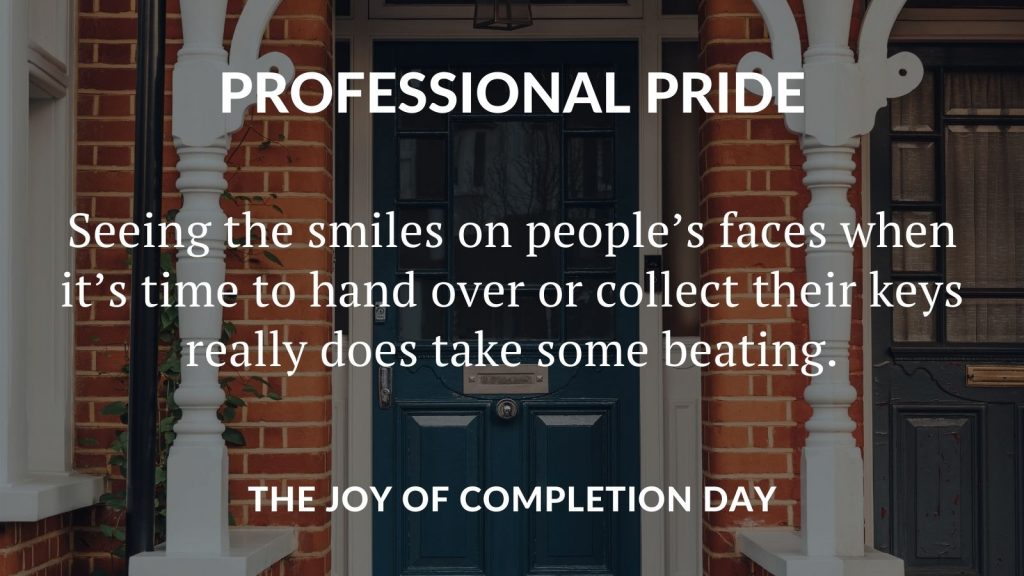
Whatever the ride was like along the way, and some sales are certainly smoother than others, all of the stresses and strains are replaced by the excitement of a new beginning. Anyone moving into a new home can’t wait to open the door, arrange the furniture and begin their new life.
It’s a day of emotion as well. If you’re leaving the place that’s been your home for a long time – maybe you’ve raised a family there and built a mountain of memories – saying goodbye will be a significant moment, but it’s balanced with starting a new chapter. For me, it means so much to have played a part in making that happen.
In Summary
Well, now you know how it feels to be an estate agent. As well as being enjoyable, challenging and rewarding, it is also a great privilege to be chosen as anyone’s agent and entrusted with their move. That is something I never, ever forget.
So whenever you come to choosing an estate agent in County Louth, I’d love to hear from you. Whether you’re ready to go now, or if you’re only just beginning to think about the next stage of your life, you’re always welcome to get in touch for a chat about your plans. Call me on 042 933 2482 or email us at info@lavelles.ie– let’s start with a conversation and see where it goes from there.
INCREASE YOUR YIELD: BETTER BUSINESS TIPS FOR LOCAL LANDLORDS

Is your rental property working as hard as it could for you? As a landlord, you’ll want to ensure that your investment is performing well and continues to make good business sense throughout the time you own it.
Homes often have hidden potential that, as well as unlocking more income, can substantially increase demand. And, as you’ll discover, there are many more options than merely increasing the rent and hoping it works out.
If you own a rental property in County Louth that’s either empty or where your existing tenants are moving out, now is the perfect time to review your options. To see how your property could work harder and smarter, call for a chat on 042 933 2482 or email us at info@lavelles.ie
Meanwhile, let’s take a look at five key areas affecting income, performance and profit to see if you recognise any opportunities for you.
REDUCE YOUR OUTGOINGS
Even when you have tenants, you’ll still have outgoings of some sort, whether a mortgage, insurance, ground rent or service charges. Finding opportunities to reduce them is an excellent way to bolster the foundations of your investment.

Look at any insurance policies you have, from buildings to contents to rent protection. Rather than wait until the renewal date, do an interim check to see if you can make savings. Often, the mere mention of switching to a different company can produce a discount from your existing provider.
If you’re paying monthly, you’ll probably only need to cancel your payments. If you’ve paid in full, many policies will offer you a pro-rata refund, but there may be an administration charge, so weigh up any costs of cancelling before hitting the button to switch.
Mortgages are usually the most significant monthly outgoing, which makes staying on top of rates your biggest savings opportunity. Again, take into account any early repayment and application charges, but if you’re on a regular variable rate, there’s probably a better deal out there.
Other refinancing options include remortgaging your primary home at a cheaper residential rate to pay off the more expensive buy-to-let loan. Or you could increase your buy-to-let mortgage payments now to take years off the repayment period, reducing your overall interest costs and freeing up more of your monthly profit much sooner.
ADD MORE BEDROOMS
If you’re looking to hold a property for the longer term, it’s worth looking at whether you can optimise the income-generating potential of the floor area.

More bedrooms generally mean more rent, so if you have a loft, you might be able to get one or two extra bedrooms up there, along with a second bath or shower room. Loft conversions are often the easiest way to increase accommodation without complicated planning consents or compromising how the existing accommodation works.
Keeping within the existing floorplate, can you reconfigure the layout? If the kitchen and living room are close to each other but separate, could they be combined into a contemporary open-plan living space while freeing up the kitchen’s old location to create an extra bedroom? Perhaps you can even install a breakfast bar to zone the kitchen and living areas while providing a social connection and a place to eat.
To make the redesigned living space feel bigger, blend the kitchen into the background using the same colour for the cupboards and the wall. Remember that the room needs to be large enough to cope with the extra people living in the property: you won’t get the best return on your investment if the result feels like profiteering or a compromise.
MAKE IT EASY TO LIVE
The longevity of tenancies and reduced void periods are crucial factors in the yield you achieve. Very often, it all comes down to how easy it is to live somewhere, so look around for any potential areas of difficulty or dissatisfaction.

Seemingly trivial issues like having a place for the vacuum cleaner, ironing board, suitcases and other household items that don’t belong on display can go a long way to keeping your tenants for longer.
With nowhere to hide things away, a home can feel temporary, as though someone isn’t planning to stay for long. And that could well come true if your tenants never feel quite settled or comfortable.
Even a cabinet in the bathroom – mirror-fronted above the basin if you’re stuck for space – can avoid an overcrowded mess of bottles, pots and toiletries bags that gathers dust and looks unsightly.
Very simply: think about how people really live and what they really need.
PRESENT LIKE A PRO
Rental homes can be at a disadvantage if they’re empty when photographed and viewed. Every last detail comes into sharp relief when there’s no furniture, textiles, gadgets or accessories to create a sense of home.

So it’s vital that everything looks great. If the walls and woodwork are looking tired, attend to scuffs, chips, and picture marks. If they won’t clean off, a fresh coat of paint can be a real lift and excite potential tenants with the prospect of moving into a freshly-decorated home.
Loose handles, wobbly taps and ill-fitting cupboard doors can also drag a space down, so don’t leave viewers with the impression that your property is falling apart. Things can come loose over time, but it doesn’t necessarily mean that everything needs replacing. Simple handyman tasks like these, along with grout and sealant in kitchens and bathrooms, are easy to fix and work wonders for first impressions.
HAVE A FULL REVIEW
If you’re using a managing agent, they should be updating you at regular intervals. If you’re self-managing, here are some things to review to maintain your property’s performance.

Occupancy: Do you have lengthy void periods, or do your tenants regularly leave after the first year? What could be wrong? Look back over the other sections in this blog to see if you’re missing a trick with your presentation, price or publicity.
Rent: are you in line with the current market? Too high and you’ll have no interest; too low and your yield will drop. Rents can fluctuate, and it’s not unknown for tenants to find a cheaper option and give notice before their landlord has the opportunity to strike a new deal, so it’s important to pre-empt unnecessary changeovers and loss of income.
Your agent: If you’re using an agent and you’re not happy with the results, take a look at how your property is being marketed and managed. You should feel in good hands at all times and confident that your interests are being served and protected. Are there areas that could improve? Can those be achieved with your current agent, or is it time to switch?
Ownership: there may be a better investment out there. Maybe your property needs a new kitchen or bathroom, but you don’t want the expense, or perhaps the service charges eat too far into the rent. It’s always worth asking yourself the question: is your property becoming too much work, and will your money do better in another buy-to-let?
In summary
Every property will have opportunities for improved performance, but not every expense is justified in every home. It’s essential to match your spend to your market and to avoid over-improving or wasting your money.
If you’re a landlord with a rental property in County Louth, don’t commit to anything major before talking to us! Call for a chat on 042 933 2482 or email us at info@lavelles.ie: we’d love to help you realise the full potential of your investment.
BEHIND THE SCENES: WHAT DOES AN ESTATE AGENT DO FOR YOUR MONEY?

“Put it on the Internet and wait for the phone to ring”. That’s perhaps how many people see an estate agent’s life, and there’s undoubtedly some mystery around precisely what agents do beyond putting a property on the market and showing people around.
While a big part of the day is being out in the neighbourhood and looking at homes, there’s plenty more work that might not be so obvious. A bit like a swan gliding majestically across a lake, there’s a lot of action under the surface to keep things moving smoothly.
To shine a light on all that happens, you’re invited this week for a look behind the scenes of Lavelles for a fly-on-the-wall experience. By the time you’ve read this blog, you’ll be armed with insider info and primed to choose with confidence the estate agent that’s right for you.
Remember that you’re always welcome to get in touch for a talk about moving home: just pick up the phone for a chat on 042 933 2482, or send an email to info@lavelles.ie. But meanwhile, let’s dive into a typical day of getting the neighbourhood moved.
MATCHMAKING
There’s definitely an art to putting the right buyer together with the right property.
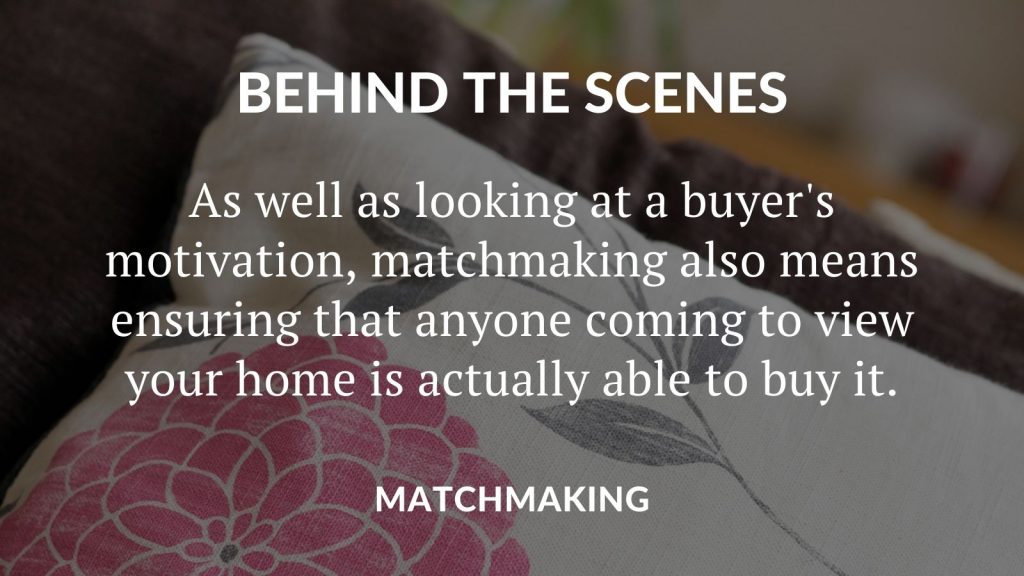
When someone sends in a viewing request for a home they’ve seen on the Internet, they usually don’t end up buying it. Sales come from listening to the hopes and desires of buyers and learning what lies at the heart of their move. Very often, people start looking for one thing but end up choosing something completely different.
Typical moving stories include simplifying a commute, needing more space, wanting to downsize, changing schools or work, finding a permanent solution to working from home, or having somewhere secure to park a prized new car.
But not every buyer needs to move; some of them simply want to. One might like the idea of a new renovation project; another might be looking for a change of scene, and someone else might find themselves with a sudden chance to move up the property ladder through a pay rise, promotion or inheritance.
As well as looking at motivation, matchmaking also means ensuring that anyone coming to view your home is actually able to buy it. Do they have a mortgage agreed in principle; are they really a cash buyer; is their current home already under offer; is there anything else that might affect their ability to move?
These factors are essential elements in pairing people with property, meaning more relevant viewings for buyers and fewer wasted ones for you.
DREAM WEAVING
Sometimes – actually, quite often! – a property that seems at first unsuitable could allow someone to create their perfect home. Not everyone gets their ready-made ideal, but with some thought, imagination and even a pencil and paper to sketch out an idea, an agent can show that a home is a good fit, even if it doesn’t fit now.

Could a house be extended to provide the accommodation a family needs in the location they love? Presenting a home that’s significantly below someone’s buying power could free them to reconfigure or expand the interior with the money they save. Perhaps a loft conversion would give them the bedroom they crave away from the kids, while a large garden might provide space for a family-sized dining kitchen.
Other creative thinking might look at whether a large living space could split to create a separate study for working from home, or whether removing a wall could provide a larger dining room for people who love to cook and entertain.
By encouraging buyers to look beyond a home’s current layout and towards its future potential, an estate agent can create excitement and the possibility of transformation. And by making introductions to local architects, builders and contractors, a project that might have felt too large can suddenly feel more achievable.
MARKET MONITORING
Photographs and descriptions are only the beginning; your agent must stay on top of the market to ensure your sales strategy stays right.

If the market rises, it may become apparent that you can achieve significantly more than your current asking figure: a few weeks at a new level might net you extra tens of thousands of euros. This same logic applies when prices weaken: a quick reduction of a few percent could save you months of chasing the market down.
Both scenarios require constant study of the market, from demand to sentiment and sales. Swift communication is essential to agree on the best course of action and to keep you assured that your interests are being looked after.
If you’re switching agents, you have the opportunity for a whole new strategy and to completely revitalise your move. Sometimes, an upward tweak of just €5 can lift you into a new price bracket with an entirely new audience of wealthier buyers. Many homes fail to sell because the asking price fails to exploit the price bands of the property portals, and a simple adjustment can change your fortunes and capture the eye of your perfect buyer.
HAND HOLDING
Have you noticed how we’re never far from a sensationalist story about the future of the property market? Whether it’s a pandemic, a change in interest rates, or a rise or fall in the number of sales, rarely does a week go by without commentary and dramatic predictions.
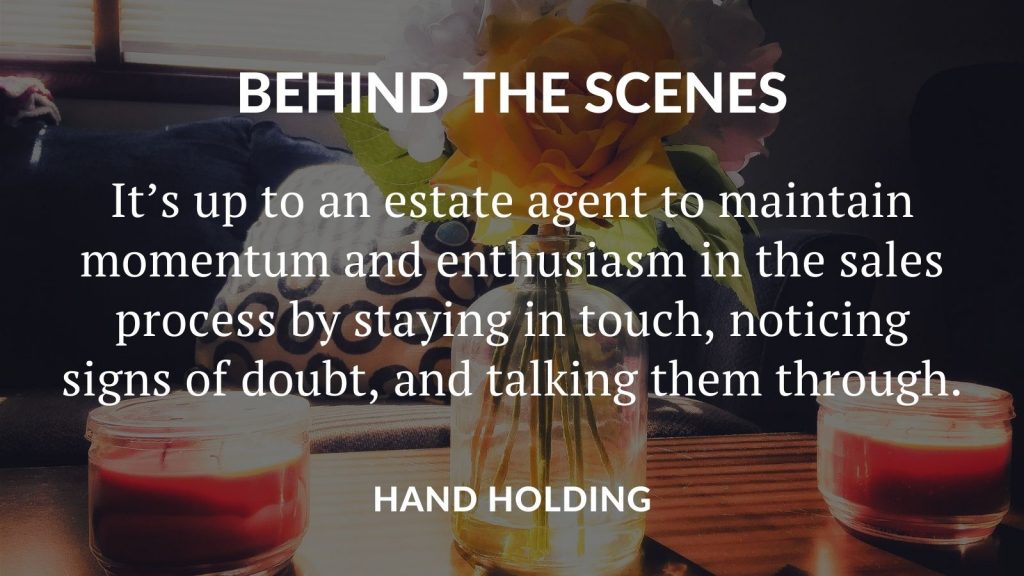
News is one thing, but scaremongering can severely impact buyer confidence and lead someone to withdraw from a purchase – regardless of the financial consequences – forcing chains to collapse and leaving multiple moves in shreds.
When a buyer reads so much negativity, it’s understandable for them to have second thoughts, but that doesn’t mean that every doom-laden story in the media needs to be followed or treated as gospel. Buyers who withdraw can come to regret their decision soon afterwards, only to discover their dream home was snapped up by someone else. When people lose sight of why they fell in love with a home, it’s up to estate agents to help them remember.
Even when positivity reigns, the days before exchanging contracts are where the reality of commitment bites. When it’s time to put the money down and sign on the line, people can take a deep breath and ask: “Is this the home we really want?”. So it’s up to an estate agent to maintain momentum and enthusiasm throughout the sales process by staying in touch, noticing signs of doubt, and talking them through.
Many sales are saved with a simple, respectful and open conversation.
PROBLEM-SOLVING
Not every sale of every property gets to exchange of contracts without a hitch. And while it’s a conveyancer’s job to carry out the legal work, it’s often the estate agent with local knowledge who provides the solution to problems.
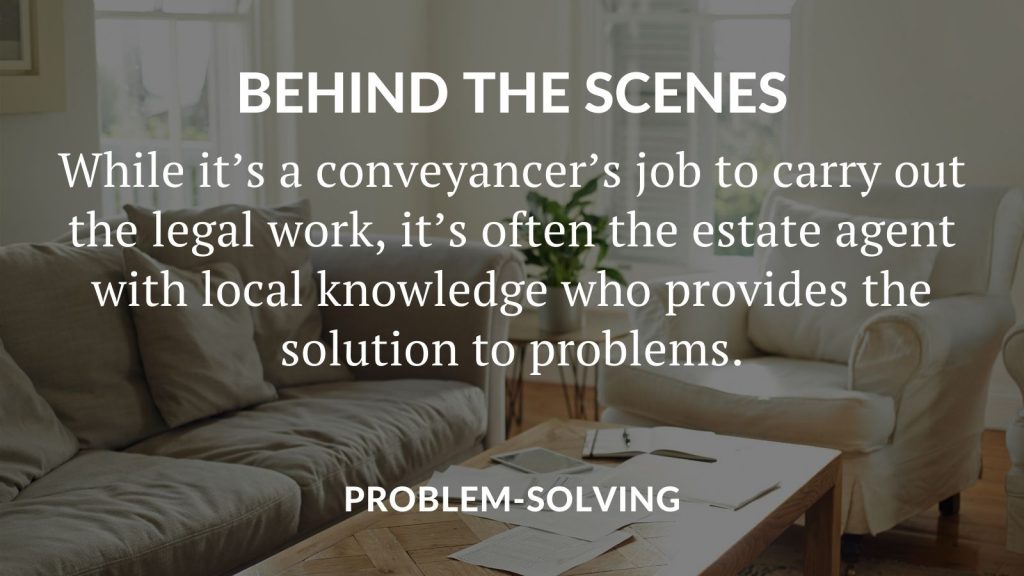
There’s no requirement for conveyancers to be in the neighbourhood, and, if you’re selling in one area and buying in another, your conveyancer will be a stranger to at least one location. So when disparities or irregularities arise, it’s an agent’s local expertise that can go a very long way.
Funny old-fashioned lease clauses might have been solved on other nearby sales; boundary rules or shared rights of way could appear odd to anyone unfamiliar; even knowing whether a house is at the top or bottom of a hill can make the difference in avoiding delays.
Estate agents are also the ones who challenge the valuations of mortgage lenders and surveyors when their figure is below an agreed price. Current ongoing sales provide the most up-to-date comparable evidence (and can be crucial to support the price agreed), but those sales won’t yet appear in the Land Registry database.
A solid case often needs to be compiled that shows a price is correct and reflects the levels achieved on other nearby homes, particularly when new ceilings are being set.
In summary
Hopefully, that gives you plenty of insight into the day and life of an estate agent. From matchmaking to dream weaving, hand-holding to problem-solving and keeping an eye on the market, there’s rarely a dull moment and hardly ever a spare minute.
It’s an absolute privilege to be entrusted with anyone’s move, so if you have a property in County Louth and would like to discover if we’re the estate agent for you, why not get in touch? You can call us on 042 933 2482 or email info@lavelles.ie – everything starts with a conversation.
DEPOSIT DISPUTES: WHY DO SO MANY LANDLORDS LOSE?

Ending up in a dispute at the end of a tenancy is one of the least inviting prospects of being a landlord, and thankfully most tenancies end perfectly amicably. But when they do end in disagreement, many landlords manage to lose their claim, leading them to feel that the system is weighted against them.
The most important thing in a deposit dispute is for the outcome to reflect the reality, whether the fault is on the landlord or tenant side. The courts and arbitration services are not there to automatically find in favour of the tenant, but it is the landlord’s responsibility to prove a claim is valid and realistic.
So, in this week’s article, we’re taking a look at why landlords – and particularly self-managing ones – lose so many disputes: from whether their claims are fair in the first place, to how they can improve the way they create and run their tenancies.
If you own a rental property in County Louth and you’ve either lost a dispute, or you’d like to chat about minimising the chances of them happening, we’d love to talk to you. Call us for a chat on 042 933 2482 or email us at info@lavelles.ie
Meanwhile let’s see where things go wrong for landlords, how the outcomes can be different, and how many situations can be avoided altogether.
SETUP & ADMIN
Whenever a property requires a knack for things to go right, you can guarantee it will come back as bad news.
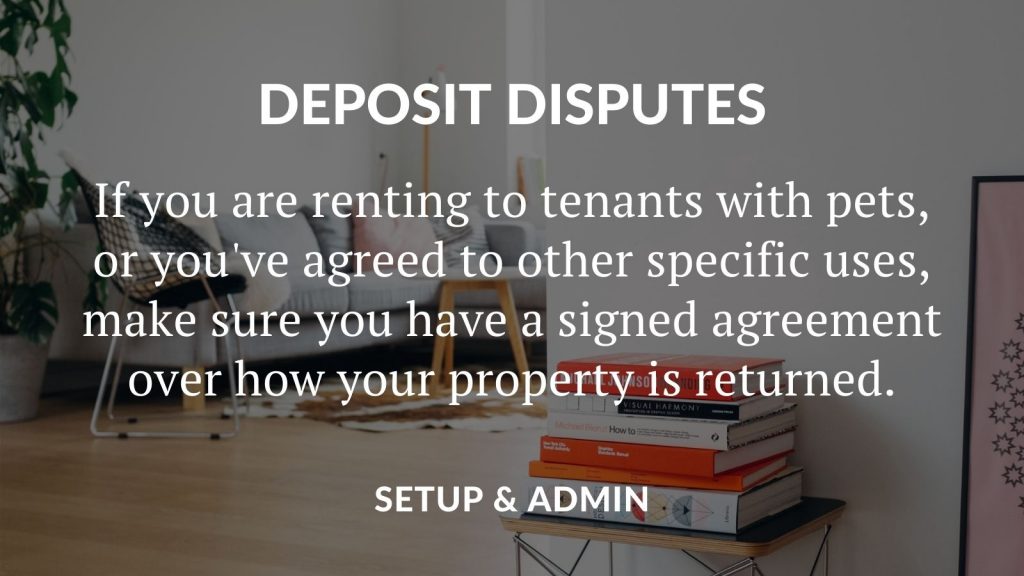
One culprit here is condensation and mould. If your bathroom or kitchen are susceptible to either, the most effective option is to install an extractor fan with a humidity sensor that automatically activates. One small job removes all the possible consequences, costs and kerfuffle. Otherwise, you’ll need to highlight the potential for mould and condensation in your tenancy agreement, and get your tenants to accept any future costs that arise from forgetting to open a window. Terms like that could lead to someone questioning whether your property is somewhere they want to live.
Another example of poor setup can be when renting to people with pets, which is usually problem-free but does require written agreement over any costs that may arise. If the responsibilities for these aren’t stipulated at the outset – from damages to smells to infestations – your claim is at risk if the tenancy agreement is unclear. You’ll find that most tenants are quite happy to sign a clause accepting responsibility for any costs arising from their pets, or any visiting ones.
FITTINGS & REPAIRS
There are plenty of landlord groups on social media where you’ll see posts that celebrate how cheaply someone has managed to renovate one of their rental properties. Often they find good-looking but ultimately poor-quality fittings that are not likely to last, and where a later visit from a contractor sends the price above the cost of buying something better in the first place.
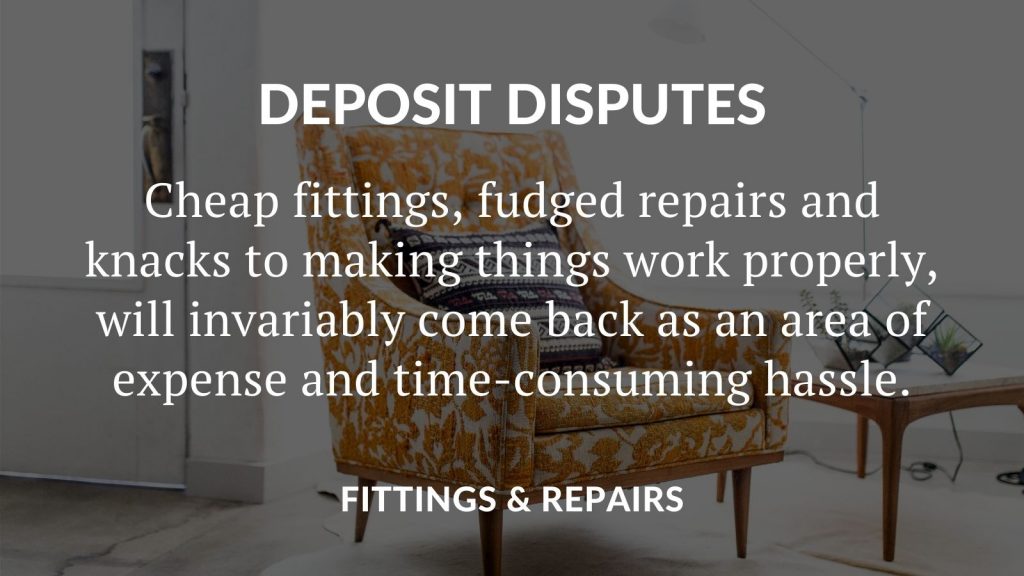
Cheap taps or laminate floors in wet areas are a couple of quick tricks to making a kitchen or bathroom shine on the surface, but your property must be durable as well. It’s tough to prove a tenant is at fault when the fittings and materials in a property simply aren’t up to the job.
The same goes for repairs: if you respond quickly and attend to repairs, you’ll show respect for your investment, your tenants, and your time. By making your property a low-maintenance home, you’ll have longer, happier tenancies and fewer repairs and disputes.
BREAKING THE RULES
Every now and then, a property gets handed back in a condition where lots of work is needed to put things right.
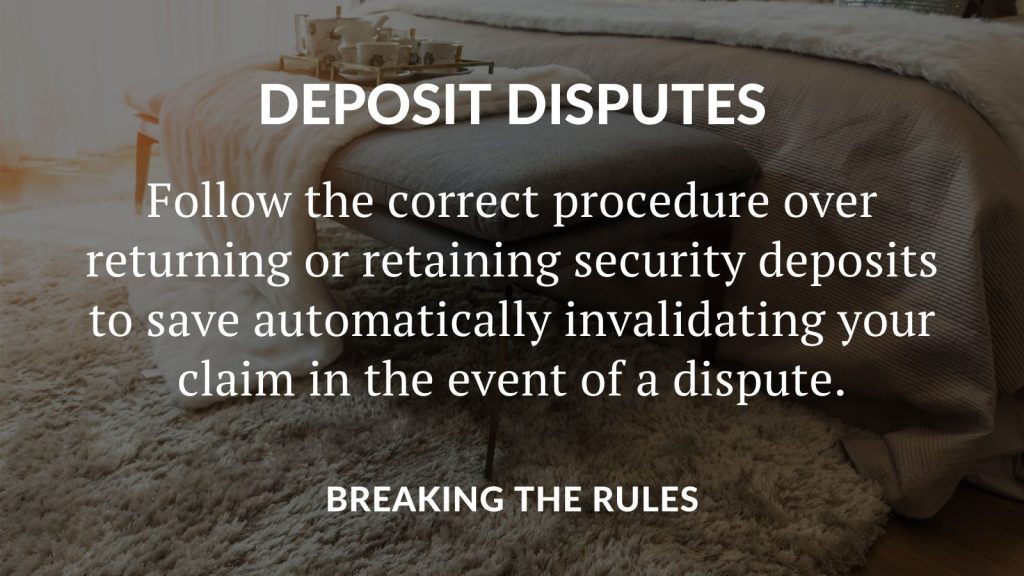
You may feel rightly frustrated, disappointed or let down, but it’s essential to keep a cool head. Whatever you do, and no matter how tempting, don’t hold onto the security deposit in a way that ignores legal procedures, or you risk invalidating your claim.
Your best course of action is to obtain quotes as quickly as possible for all the works and costs, then submit them to the previous tenants along with any reports or photographic evidence, and with clear and comprehensive details about why they are responsible. You don’t need to wait until you’ve settled your dispute to carry out any repairs, so your next tenancy needn’t be delayed beyond the completion of the works.
Of course, it’s a hassle, and you may not even want to speak to the people who’ve left your property in such a state (one of the benefits of having a managing agent to deal with it on your behalf!). Still, clear communication without resorting to angry recriminations is the most likely route to a swifter settlement.
CLEANING CONFLICTS
The largest area of dispute between landlords and tenants is cleaning, accounting for around 25% of all claims.
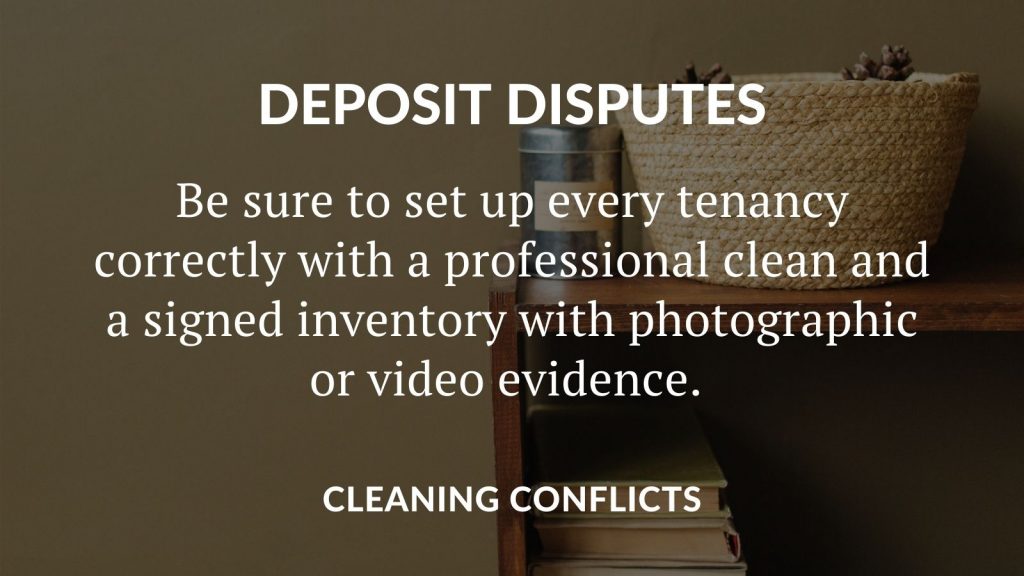
In a way, it’s comforting. Cleaning is not about breakages, repairs or arguments over wear & tear, so it’s effectively a small dispute. Regardless of who wins, it’s straightforward enough to get a property cleaned, but what a waste of everyone’s time for such a mundane thing!
Of course, it can be more than a trivial issue if your incoming tenants have to move into an unclean home. It’s not a great start to a tenancy, and a professional clean is more difficult to obtain while there are boxes everywhere and your tenants unpack.
Generally speaking, a dispute over cleaning comes up when one side skimps. Suppose you don’t hand your property over in a professionally-cleaned state, and you don’t employ an inventory clerk to take photographic evidence. In that case, any claim will be difficult to win at the end. The same goes for outgoing tenants: if they sign off on the cleaning when moving in, but can’t produce a receipt for a professional clean when they leave, they are unlikely to win a dispute.
UNFAIR CLAIMS
Unfortunately, some landlords do attempt unjustified or exaggerated claims against their tenants.
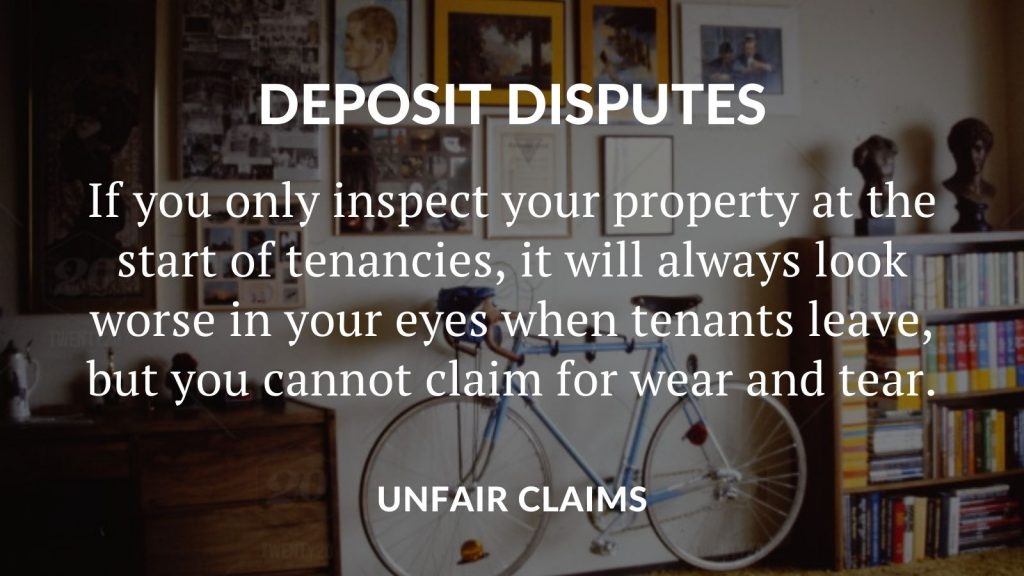
If you don’t regularly inspect your property, there could be a few years between your visits, during which time signs of wear and tear will develop. Scuffs on walls, woodwork and floors are a part of life; ovens don’t stay looking like new; neither does grouting or sealant – not even in the homes of landlords!
Areas like these are more noticeable when a property is empty than when it’s lived in, and they’ll also look far worse to you if it’s been four years since your last visit.
Regular inspections are invaluable and, for us, they’re a normal part of the day. Anything that might have gone unnoticed in the everyday distractions of life tends to get picked up before it becomes a major problem and a cause for a dispute.
In summary
As a landlord, there’s a lot you need to get right: not just to minimise the opportunity for disputes, but to ensure you don’t automatically lose them. The many laws that cover lettings are there to help you run your tenancies effectively, and well-maintained properties tend to attract higher-quality tenants, most of whom will love their home and treat it as if they owned it.
As a self-managing landlord, it can sometimes feel like an awful lot to stay on top of, so you might want to explore having your rental investments looked after by people who do it every day. If you have a property in County Louth and you’d like to discover whether using a managing agent is the right decision for you, why not get in touch? Call us for a chat on 042 933 2482 or email us at info@lavelles.ie– we’re here to make your life as a landlord as easy as can be.
TIMING YOUR MOVE: HOW TO CHOOSE THE PERFECT MOMENT TO SELL

Have you ever wondered how to pick the perfect time to sell your home? It’s probably the question we’re asked the most when talking to people about their move.
But how do you pick your moment with so much conflicting advice? Should you exploit the new year rush, or sell in the spring when the blossom is on the trees? Is it better to get in before the summer holidays, or wait till the kids have gone back to the school in September, or join the Boxing Day Bounce?
You’re certainly not alone if you’re a little confused, but there’s more to selling your home than picking the time of year. And while it’s not a scientific formula, there are elements worth considering when choosing when to move.
Our team is always on hand to discuss your moving plans. If you’re considering selling your property in County Louth and would like to talk about timescales, current demand or anything else you’re unsure of, call us for a chat on 042 933 2482 or email us at info@lavelles.ie
Meanwhile, let’s take a look at how you can choose a moment to sell that fits with your plans and finds you the perfect buyer. What you’ll discover is that it’s not just a matter of when you sell, but why and how you do it.
NEEDING MORE SPACE
The reason why most people move is outgrowing their existing home. That could be from accumulating stuff, to moving in with a partner, to starting or growing a family.

Perhaps the first question to ask is whether moving is your preference. If your current home offers you the potential to extend, would you rather stay where you are? Extending can save you all the costs of buying and selling; money you can spend on your building works instead.
But if moving is the more realistic option – or you’re excited about the prospect of living somewhere new – here are some things to consider.
If you’re expecting an addition to the family, you’ll want to avoid a move around the time of birth. Your best option is to aim to be in your new home a couple of months early, giving you plenty of time for settling in and preparing for your new arrival. Alternatively, wait until a few months after your baby is born when you’ve got your energy back.
Where older children are involved, and assuming no change of school, you’re free to move whenever you want. But look a bit further down the line from the move you’re considering now.
If you need an extra bedroom to give a teenager their own space, will you need to do the same again in another few years? If that’s the case, consider finding a house that your family can grow into. And if that’s too much of a jump, look for somewhere with potential to extend later on: a good-size loft, or space to the side, could give you extra bedrooms when you need them, as well as a longer-term family home.
CHANGING SCHOOLS
Getting your children the best education could well mean moving to the catchment area of the school of your choice, or at least closer to it.

Everyone’s preference – from teachers, to parents, to children – is to avoid disrupting the school year, which means moving in the summer holidays between the end of July and the beginning of September.
The current average house move takes between 15 and 25 weeks: that’s from the first day on the market to the day of completion, so you’re looking at a 4-6 month timeframe. To be settled in nicely for the new school year, March is a sensible moment to put your home on the market.
Don’t worry about feeling you’ll need to move too soon. It’s far easier to agree a delayed completion when you give yourself the time to find the right buyer, than it is to be desperate for a fast mover if you leave things a little too late.
RELOCATING FOR WORK
An unexpected work opportunity may spring out of nowhere, leaving you feeling it’s a chance you shouldn’t pass up. But relocation is about so much more than career and salary. You’ll be saying goodbye to your current life – friends, neighbours and favourite places – so it really needs to be a move worth making, particularly if you’re happy in your home right now.

To get a real feeling of where you’d be moving to, spend a weekend there exploring and researching. Alongside practicalities like schools, shops and transport, make sure your free time will be fun and fulfilling. Do you like a lively cafe for weekend coffee and breakfast; do you want great local pubs with Sunday roasts and beer gardens; do you like to exercise in the great outdoors, or simply enjoy parks and green space? Think about the things in life you enjoy.
Your timing to sell will depend on when you take up a new position. If you’re looking to start very soon, renting out your home first could be your best option, with a view to selling later when you’re settled: this may also give you comfort if you feel you might return. Alternatively, a relocation package that includes out-of-pocket costs like rent, mortgage and fees, could make selling your home now a sound financial proposal.
You’ll have plenty to juggle, so speak to your estate agent about your preferred timescales and the current demand for homes like yours to decide whether selling or renting is right.
DOWNSIZING
A house that’s become too large will be full of memories, and this can make the idea of moving a difficult thing to consider.

Perhaps now is a good moment to say that memories will follow you wherever you go; they don’t get left behind when you change your address and they can be even more joyous when free of those unused rooms filled with furniture and belongings.
If you’re already thinking about downsizing, it’s a sign that your home has become too much to manage, or no longer reflects your lifestyle. Nonetheless, it’s a big decision to sell.
A good way to know if it’s right for you is to think about your future. Have you thought about moving to a cottage near the sea, or swapping a big old house for a modern apartment opposite a park or river? By concentrating your thoughts on new possibilities, you can see if they warm your heart. Perhaps you’ll see change in a different light.
Talking to an estate agent about the value of your current home, followed by a just-for-fun browse of what’s available in your dream location, will give you the knowledge and inspiration to choose your next step.
ON A WHIM
There you are on a Tuesday evening, casually scrolling through your favourite portal with Netflix on in the background, and suddenly there it is! The home of your dreams drifts onto your phone screen and, even though you weren’t really thinking about moving, that photo has got you hooked. There’s nothing else to be said; that’s where you want to live.

It’s not as rare or fantastical as it might seem, and while it might not fit with your estate agent’s advice – find a buyer for your current home before setting your heart on your next one – life has a habit of presenting opportunities in the moments we least expect them.
So you go to see the property, and it’s as wonderful and perfect as you’d hoped. You get on really well with the estate agent and the owners, you agree on a price, and they even give you some breathing space to get your property sold.
Now it’s time to get onto your estate agent and get your home on the market straight away. You’ll need to keep the people you’re buying from onside and patient, so this isn’t an occasion for being overly ambitious on price. When their estate agent phones your estate agent, they’ll want to hear confidence and realism to stick with your offer.
In summary
It can be easy and very tempting to over-strategise about the month, season or market conditions when it comes to selling your home, but the best guide to when the time is right is when it feels right for you. It’s your circumstances and your lifestyle that should always be the driving factors behind your move, and even though it could well be the largest financial transaction you ever make, moving home is about so much more than money.
If you own a property in County Louth and you’re unsure of whether or when to sell your home, please do get in touch with our team. Call for a chat on 042 933 2482 or email us at info@lavelles.ie: you’ll always find an expert and friendly ear who’s happy to listen to your plans, and to help you find the right path.
BUILD A PORTFOLIO OF POPULAR & PROFITABLE LETTINGS

Do you think it’s impossible to be popular AND profitable as a landlord? Perhaps you feel that one cancels out the other; that it’s a choice between hard-nosed business and being nice, but that the two are fundamentally incompatible?
You wouldn’t be alone in your view, but it’s perfectly possible to have a successful rental portfolio that’s a commercial success while being on excellent terms with your tenants. Questioning how your rental properties could be popular can help you increase your returns by owning a collection of in-demand homes where people really want to live.
Growing your rental portfolio can provide you with a secure financial future and provide many people with a wonderful home. Whether you are an experienced landlord looking to expand your portfolio, or you are looking for your first buy-to-let investment, this week’s blog is for you.
We work with many landlords and their rental properties in County Louth: some we’ve helped grow their portfolio, and some are just starting out. Whatever stage you’re at, you’re welcome to get in touch about any aspect of buy-to-let: call us for a chat on 042 933 2482 or email us at info@lavelles.ie
Meanwhile, read on to discover how you can build a profitable and popular portfolio to enhance your life, and be a hit with your tenants.
FOCUS & FINANCE
It’s sensible to decide which part of the rental market you want to focus on. If you’re looking to rent to families, do some research around the best local schools. Offering a home in the catchment area of an outstanding-rated school will give you plenty of demand as diligent parents move the earth to get their children the best education.
Or do you want young professionals? In which case you’ll need good transport connections nearby along with places to enjoy the neighbourhood. An excellent local coffee shop; a pub with Sunday roasts and a great selection of ales, and a weekend breakfast spot are all high on the lifestyle criteria of busy singles and couples.
Whichever market you’d like to explore, check where the demand is with local letting agents. Which types of rental property have a continuous shortage? Where can you find those homes in the neighbourhood? That’s a good target.
Even though it’s tempting to rush out and view potential properties, having your finance in place first will give you confidence in knowing exactly what you can afford, and help you move on an opportunity quickly.
Talk to an experienced financial adviser with knowledge of buy-to-let lenders and products so they can recommend a solution that fits your circumstances. You’ll find a financial adviser invaluable in sifting through all the various lending criteria, so you don’t have to spend your evenings trawling Google or comparison sites.
As well as your mortgage, make sure you have the money in place for the associated costs of purchasing a property, as well as for any renovations you intend to carry out: never start a building project without having the cash to complete it. If you end up having to halt the works until you’re in funds again, you could lose all your contractors as they head off to other jobs, leaving you with an empty property, no rent, and mortgage payments due.
KNOW YOUR ONIONS
Whether you’re handling all the management yourself or employing a managing agent, keeping your portfolio to a single area or neighbouring postcodes makes life much easier.
You’ll increase your local knowledge, and your familiarity can save you hours of research over local property prices, protecting you from misinformation or being overly hopeful.
Managing a portfolio also requires a trusted circle of reliable contractors who can leap to your aid when an emergency hits, and keeping your portfolio close together will save you hunting for contractors in multiple locations. Imagine needing five different groups of contractors for your five rental properties in five separate cities: try dealing with that!
And if you’re using a managing agent, the whole point is to give yourself less work. The fewer points of contact, the easier it will be for you to talk about your portfolio and the closer your relationship, resulting in more opportunities. Landlords who want to sell often speak to their managing agent first to see if they know another landlord who’ll buy their property without the hassle of going to the open market and frightening away their tenants.
CASH IS KING
Cash flow is the most important thing for any business, and the lack of it causes many companies to fail. If your rental property becomes a monthly drain on your finances, the entire experience of being a landlord will be tainted by money concerns.
Many landlords become fixated on capital growth, forgetting about yield. If you want to secure a financial future for yourself, then clearly the value of your property is a factor but is largely out of your control.
Your rental yield is a vital component of a sustainable lettings portfolio and will help you build an emergency fund for unexpected problems and regular maintenance. Imagine having to dip into your own pockets for every issue or repair.
A property’s rental income must cover all of its monthly outgoings. It’s sensible to build in a cushion against rising interest rates as well, particularly when those rates are as low as they are right now.
POPULARITY WINS
Being popular is a rarely discussed aspect of being a landlord. You might even see it as an impossible dream. But being a popular landlord is a much easier life than being an unpopular one. It will give you a more reliable, more comfortable and more enjoyable experience, both personally and professionally.
Creating a collection of well-presented and well-maintained homes will give you several benefits:
- – Longer tenancies. With fewer void periods and less work, you won’t be continually looking for new tenants or having to arrange check-ins, check-outs, inventories, or notifying local authorities and utility companies.
- – Local lettings agents will love you and take to letting your property with genuine and profound enthusiasm because you’ll have made life easier for them to find you the
perfect tenant.
- – More rent. People are staying longer and longer in rental properties – the average is now around four years – and they’re looking closer than ever at fixtures, fittings and condition. A rental property is no longer a temporary stopgap for six months or a year, and people will happily pay a higher rent in return for a higher-quality home.
- – Politeness. There will always be something that goes wrong, but if your tenants are in love with their home, they’ll be far more likely to report an issue early – before it becomes a bigger problem – and in a far more friendly way.
- – More opportunities. Becoming known as a great local landlord will put you in pole position when other potential rental investments come up, making it easier for you to expand your portfolio. Nightmare landlords often have to buy at auction and self-manage, because local agents don’t want to deal with them or their problem properties.
FIND A CARER
What’s your goal? Are you looking to switch careers and become a full-time self-managing landlord with a completely hands-on approach to maintenance, tenants and repairs? Or do you want to grow a rental portfolio to supplement – or replace – your current income with as little work as possible?
If you don’t want to manage everything yourself, you could employ someone to look after your portfolio if it’s large enough. Ensure that you’re not simply doing a friend a favour by giving them a job; you need a manager who knows exactly what they’re doing and has experience looking after rental properties and tenants.
Of course, the way to be sure of management expertise and a circle of local contractors is to use a managing agent. They’ll have rooted out the disastrous contractors from the good ones, and they’ll have the leverage to get preferential treatment. When maintenance issues arise, they’ll be dealt with quickly, correctly and at a reasonable cost.
Managing agents exist to save you money and time and are the perfect solution for growing your portfolio as a substantial, sustainable and passive income.
Check them out first by speaking to the property manager with whom you’ll be having a long-term relationship. It’s essential to have confidence in them and feel you can have a sensible conversation and receive the correct guidance. Ask them how long they’ve been managing properties; how many they manage; how often they carry out inspections and how they deal with out-of-hours emergencies.
Don’t be afraid to ask questions: the right managing agent will be only too happy to put your concerns to rest.
How was that?
Would you like to talk about growing your existing lettings portfolio? If you’re looking to acquire more – or your first! – rental property in County Louth, or you’d like to talk about using a managing agent, why not get in touch?
We’re here to help you make the most of being a landlord, so call us for a chat on 042 933 2482 or email us at info@lavelles.ie
WARM WELCOMES: TURN YOUR COLD VIEWERS INTO HOT BUYERS

There are still two months of winter before spring hits on March 21st, so if you’re selling your home in the chilly season, it’s essential to extend the warmest of welcomes to potential buyers when they visit.
The sensations of comfort and joy that make you glad to be indoors are precisely how your viewers should feel as they enter your home from traipsing around in the cold. By warming their bodies and seducing their souls, you can deliver an invitation to stick around not just for now, but forever. And if nothing else, you’ll have proved that the heating works!
So let’s take a look at how you can capture a feeling of irresistible cosiness – the Danes call it hygge – throughout every corner of your home. Read on and discover how cold viewers can be turned into hot buyers, compelled to contact your agent with a full asking price offer and determined to make the place where you live, the place they call home.
HALL OR NOTHING
Think how wonderful it feels when you return home from a long winter’s walk, a trip to the shop in the freezing cold, or a busy day at work. You put the key in the lock, open the front door, and feel the warm air from inside blow over your face.
Then, as you step into your hall and take off your coat and shoes, you exhale a satisfied “ahhhhhh” as you head into the kitchen to put the kettle on, happy in the knowledge that you’re in and toasty for the evening. That’s the feeling to create for everyone who comes to view.
Start with a greeting as welcoming as Santa, and put your outdoor lamps and hallway light on a timer. With one simple automation you’ll never fail to present a daily come-inside glow the minute that dusk begins to fall.
Inside, make sure the temperature encourages your viewers to stay and savour your home, rather than scurry about with their arms wrapped tightly around them while their breath steams in the freezing air.
LOUNGES TO LOVE
Not everyone has an open or real flame fire, but for those of you who do, it’s time to put it to work! If you’re around shortly before viewings, be sure to leave the fire lit so it’s crackling and popping in readiness for your visitors. (Or ask your agent to arrive early and set the scene.)
To combat the darker days and longer nights, turn your side lamps on and check to ensure they’re radiating a soft and mellow light. That means bulbs with warm-white and soft tones, rather than stark, interrogation-room fluorescence.
Now turn to your couch and armchairs. Do they call you to sink into the upholstery, or do they encourage you to stand? A chunky-knit throw over the sofa is an invitation to fall into its comforting arms, while a simple cushion can turn an empty armchair into a snug reading or whiskey spot.
KITCHEN COMFORTS
Pop a butternut squash on your worktop and try saying it doesn’t make a difference! Winter vegetables – and squashes and pumpkins in particular – have a glorious presence and are nature’s very own works of delicious and edible art.
But why stop there? Stand a winter recipe book behind them, like Riverford’s Autumn & Winter Cookbook with its stunning cover of colourful gourds. With a simple stroke you’ll conjure convivial imagery in your viewers’ minds of snug winter evenings with hearty stews, soups, conversation and laughter.
And if you’d been thinking of baking an apple and cinnamon crumble but were holding off for the right occasion, the perfect moment to fill your home with delicious aromas is just before a viewing!
BATHROOM BLISS
With their tiled surfaces, chrome accessories and bright white fittings, bathrooms can sometimes feel clinical and cold. That might be a welcome respite from hot summer days, but the winter months require a warmer touch.
Timber and textiles are your friends here. As purveyors of romance and comfort, their very presence can transform the look, feel and acoustic of your bathroom, turning a hard and echoey space into a soft and soothing one.
Wood goes with everything, and its grain and tone will enrich any setting and style. Bamboo bath shelves look brilliant when loaded with soaps from Lush and amber medicine bottles, while an oak duckboard in front of the shower makes a chic alternative to a soggy mat.
Folded fluffy towels are a fast and foolproof injection of luxurious texture, while sumptuous robes hanging from hooks turn up the spa-quality. You could even keep special sets of both that are purely for viewings: buy the ones you want for your next home now, but use them only for show when potential buyers visit.
Remove any bathroom products with garish bottles or tubes (that means most of them!) and only display your aesthetically-pleasing pots and potions like Rituals, Aesop and Jo Malone.
SLEEPING SANCTUARIES
When it comes to a dream bedroom, it’s remarkably easy to create a seductive inner sanctum no matter how minimalist or maximalist your lifestyle.
The simple act of laying a thick blanket or throw across the bottom half of the bed will instantly spice up your bedroom’s allure, with bonus points for a couple of woven cushions in front of your pillows
If you’ve got a wall that feels bare, hang a large print to break up the barren expanse, or try the hotelier’s hack of painting the wall behind the bed in a rich, velvety tone for an elevated boutique experience.
A fabric laundry hamper can swallow any wayward clothing, while the living-room trick of soft-tone bulbs for your bedside lamps will melt the heart of anyone coming to view.
OUTSTANDING OUTDOORS
Even if you’re staying inside for as much of winter as you can, it doesn’t mean your garden or balcony can’t look beautiful and inviting.
Lighting is essential: your viewers need to see what’s out there so they can fall in love with it. So check your exterior lights are working and, if you don’t have any installed, sling a string of bulbs between walls or trees for charming winter magic.
If you’ve got a covered deck or patio where your furniture won’t get battered by the elements, leave your table and chairs on display. Even when they’re not in use they can still demonstrate what a wonderful place you have to sit and enjoy the outdoors.
The next best option is to store them away in a shed or garage, with furniture covers coming in third as the final resort: while they’re supremely practical, they’re rarely a stylish accessory.
You can still buy colourful winter flowers like cyclamens and pansies from garden centres that are already in bloom, and they look far better in your pots than dead leaves or desolate soil.
In summary
Can you see how easy it is to create the warmest of welcomes and a delightful viewing experience for anyone coming to view? With a few minutes of online ordering, you can have your home looking and feeling like an irresistible place to hide away when it’s cold and bleak outside.
If you have a property in County Louth and you’ve been struggling to find a buyer, or if you’re thinking about selling, why not get in touch? Call us for a chat on 042 933 2482 or email us at info@lavelles.ie we’d love to help you make the most of winter viewings so you can get your move underway.
PROS OR CONS: IS A MANAGING AGENT WORTH YOUR MONEY?

It takes a certain character to be a managing agent: the job has a reputation as a thankless task with days full of complaints, emergencies, breakdowns and hassle. And if we’re honest, rarely does anyone call with news that everything’s just fine.
But to be a managing agent is also to be the person who makes everything right. A property that never needs maintaining, or where nothing ever goes wrong, simply doesn’t exist and emergencies rarely happen at a convenient moment: not for homeowners, not for tenants and certainly not for landlords. For a managing agent, they’re an expected part of the day.
Whether you’re an existing or budding landlord, you’re right to keep an eye on your outgoings. You might even have questioned whether a managing agent is really worth the expense. But do you include the personal costs as well? How much do you value your time and how you spend it?
This week’s blog is not to convince you to use a managing agent, but to show you how life could be if you did. From inspections, maintenance and easier accounting, to keeping you on the right side of the law and protecting you in the event of disputes, here are five one-minute morsels of how we look after our landlords, and what we could do for you.
KEEPING THINGS LEGAL
If one of your hobbies is scrolling through the government’s website for changes in legislation regarding rental property, you are unlike anyone we know.
It’s a time-consuming task and a rolling responsibility that many landlords fall foul of: you need only to look at the eye-watering number of landlords who lose disputes. If you get anything wrong in the legal process, the law will likely find in favour of your tenant.
But while landlord and lettings legislation is certainly a minefield, it’s not one you need to walk through. Managing agents are charged with knowing all there is to know and taking the appropriate action. It’s not something on top of our job: it is our job, and it’s made far more workable by having all day, every day to do it.
As soon as a new piece of legislation becomes law, we ensure that every single property we manage is brought in line and on time: our landlords rarely need to do a thing. Imagine if they all had to clear their individual days to find out precisely the same information as each other – how many wasted hours of life is that?
TRUSTED CONTRACTORS
Have you ever been in a conversation about the difficulties in finding reliable companies to repair something at your home? Or where a contractor came in, charged the earth and made the matter worse? Almost everyone has experienced some version of that.
It’s one thing waiting in for a plumber at your own home, but when it comes to meeting them miles away – and with a three-hour arrival window in the middle of winter – it’s really not the same. And if they don’t turn up at all, or you need to revisit when the works aren’t done correctly, it’s more hours out of your life and a less than happy tenant.
It’s taken us years – and plenty of tears – to develop a circle of trusted tradespeople. We’ve met disastrous contractors along the way, but our list of long-standing connections can deal with almost every kind of emergency and problem you can imagine. There’s rarely something that comes up that we haven’t dealt with before.
Our strong relationships mean that we often get priority treatment, with repairs attended to quickly, properly and at a reasonable cost: a win-win situation for everyone.
TAX RELIEF
Where do you keep your receipts? If you’re anything like most people it’s a combination of inside your wallet or purse; generously sprinkled across numerous pockets; and the occasional triumph involving the box file marked ‘receipts’ (a purchase made with perfectly good intentions, but rarely enjoying its intended role).
And when it comes to completing a tax return, we can add checking a year of credit card and bank statements, and trawling back through emails for online orders and purchases. The unappealing nature of the task means it’s generally left to the very last – and somewhat stressful – hours before the deadline, so unless your perfect drinking partner is the self-assessment website, it’s hardly an ideal evening for enjoying a bottle of Pinot Noir.
Now, just for a moment, imagine receiving a statement of all your income and expenditure for your rental property without a single piece of paper to lose. If all the information you needed was there to cut and paste directly into the self-assessment website, how much time, energy and brain space would that free up?
Some of our landlords tell us it’s worth the management fee alone.
REGULAR INSPECTIONS
Whether you’re an intentional or an accidental landlord, one of the main attractions of buy-to-let is the thought of passive income. But a truly passive income means doing nothing at all, and the act of owning a rental property doesn’t mean there’s nothing to do.
Most landlords are responsible people, and part of being a responsible landlord is visiting your tenants at regular intervals; not only to identify and discuss any maintenance or enjoyment issues, but also to nurture a healthy relationship. You’d certainly save time if you never inspected your property, but your message of disinterest might well be returned by your tenants.
It’s the same with your own home: when you actively keep an eye on things, you spot potential problems fast and prevent them becoming more complicated and costly. A fresh pair of eyes almost always highlights something that’s been missed or unreported, so inspections are an invaluable part of a tenancy.
But there’s no escaping that they are work, and they take time. Your time.
CONFRONTATIONS
The odd malfunction or minor repair is one thing, but when problems come one after another – or where your tenant experiences a change in circumstances, or becomes a nuisance – the relationship and communication can become strained.
You’ve probably had the experience where it feels like things keep going wrong at home: first the boiler; then the washing machine; then an extractor fan; then a tap. On their own they’re tiny issues and often a matter of wear and tear, but the difference is that your extractor fan is not interrupting someone else’s life. You might be a bit miffed when it stops working, but no-one is getting angry with you.
Now let’s consider a tenant whose finances take a turn for the worse, or someone who causes problems among your neighbours, whether deliberately or accidentally. Thankfully these occasions are scarce, but there is rarely any warning and they can have major implications for you as the landlord, which might affect your ability to keep your cool.
Having a third party, and one of authority, to step in on your behalf can help alleviate situations fast, without them ever getting personal or overheated.
So how does that sound?
Are all of the duties of a self-managing landlord adding value to your life, or can you see the benefits in having them handled for you?
Think of a managing agent as a scientifically impossible preventative ibuprofen: you might not be able to plan for a physical headache, but you can reduce the risk of your rental property becoming a pain in the neck.
For us, emergency repairs, regular maintenance, changes in the law and unexpected events are not inconvenient interruptions: they’re exactly what we’re waiting for. We certainly don’t spend our days doing nothing, but we do spend them ensuring that you have nothing to do.
If you have a rental property in County Louth and you’re wondering how a managing agent could make your life as a landlord easier, why not get in touch? Even if you’re still on the fence, call us for a chat 042 933 2482 or email us at info@lavelles.ie we’d love to help you turn your rental property into a truly passive income.
SWIFT, SAFE AND SURE: THE GUIDE TO SELLING YOUR HOME IN LOCKDOWN

If you’d been waiting until the new year to put your moving plans into action, you might be wondering whether to put them back on hold. But if you do that, when will you be able to think about moving again?
Let’s start by saying that 2021 is very different from the first lockdown of March 2020. This year, the housing market has been allowed to remain open, and not just because of its economic importance: our wellbeing is equally vital, and life doesn’t simply stop. (You need only look at children and how they’ve continued to grow, regardless of a national lockdown and global pandemic.)
With clear government guidelines in place around every aspect of buying and selling a home, most businesses connected with the housing market have adapted to keep people moving. Estate agents, photographers, energy assessors, conveyancers, lenders and removals companies have all found ways to operate safely and efficiently to help you get to where you want to go. On top of all that, the market is really good!
So this week’s blog is about the current realities of getting your move in place. From putting your home on the market and managing viewings to the legal process and moving day itself, you’ll be pleased to know that you can capture the market’s momentum and move safely and swiftly in lockdown.
VALUING YOUR HOME
If you are looking to move soon, we can meet you in your home to provide a full market appraisal around saleability, presentation and setting an asking price. If working from home and home-schooling means you’re fuller than usual, we can either fix a time when fewer people are present or find a way to minimise contact during our visit.
The same arrangements apply to organising photography, floor plans and Energy Performance Certificates. With restrictions in place around the number of households present at any one time, we’ll need to arrange these visits separately rather than simultaneously. Nonetheless, we can still get your home on the market in roughly the same timescale as usual.
If you’re not thinking about moving just yet but would like some advice on the market value of your home, we can arrange an appraisal by video to give you an idea of asking price, nearby sales and what to have in place for when you’re ready to go.
HOSTING VIEWINGS
One of the more positive aspects of lockdown is how viewing restrictions have introduced further requirements to filter serious interest from casual enquiries.
We check that anyone wishing to view your home is in a position to move right now, from confirming that finances are in place to checking that chains are complete where someone is selling. You can be sure that every viewer will be a ready, willing and able purchaser.
Although in-person viewings are allowed, we’re strongly encouraging virtual tours and detailed discussions before personal visits. We need to minimise the number of people from different households in your home at any one time, so open days are not allowed, and all viewings must be by appointment.
We’re keen to minimise the disruption to any arrangements you have in place around working from home or home-schooling, and we can incorporate no-go times into viewing schedules. And if you have a neighbour in your bubble, can you decamp there while we’re showing people around?
SEIZING MOMENTUM
Right now, the market is on your side with high levels of enthusiasm and enquiries. It may seem remarkable, but lockdown has driven the level of activity upwards because moving home is one of the few areas of life to remain open.
You can capitalise on the moment with precision pricing, perfect presentation and gathering the information a buyer might want to see before submitting an offer, so dig out any guarantees and certificates along with recent utility bills.
Although in-person meetings might look very different, we are available by email, video and phone to speak to buyers and answer their questions around timescales, fixtures, fittings and price. In short, you can receive, negotiate, accept or refuse offers just as usual.
LEGAL & LENDING
To minimise potential delays after accepting an offer, start every process as soon as you can to make the most of the time your home is for sale.
Although solicitors have been mostly unaffected in their internal operations, it pays to instruct one as soon as you put your property on the market. They can help you start collating paperwork now in readiness for when you agree a sale.
Mortgage application times were severely affected after the first lockdown, so if you plan to take a mortgage on your next home, get your loan agreed in principle now. Lenders are catching up on the backlog from the summer and autumn boom, but it’s wise to move the process forward as soon as you can.
MOVING DAY
Before we get into the logistics of what you can and can’t do on moving day itself, we must remind you to pack the kettle, cups and teabags last! Don’t get stuck without essential refreshments, and remember you can only supply them to your household and bubble (and not your removals team).
Now is a sensible time to start exploring removals firms to identify the ones providing everything you need. Some companies have withdrawn their packing services, while others have limits on the number of people allowed from your household while their teams are loading and unloading your belongings.
If you plan to do your own packing and moving, don’t forget you can only ask your household and bubble to help: unfortunately, you can’t invite a party of friends and family to wrap your plates and carry your furniture. To break the packing process down into manageable pieces, begin as soon as you know a completion date.
In summary
Lockdown needn’t get in your way if you are looking to sell your home soon. The property industry has learned a lot since coronavirus entered our vocabulary, and we’ve become quite adept in keeping everyone safe and moving with minimal inconvenience.
If you have a property in County Louth and you’re unsure whether to put your moving plans into action, why not get in touch? We’re available by phone on 042 933 2482 or email us at info@lavelles.ie – we’d love to be a part of making your move happen.
LET’S GET ORGANISED: NEW YEAR’S RESOLUTIONS FOR LANDLORDS

From giving up smoking, to a change of diet, to getting in some exercise, now is the time of year when all sorts of new year’s resolutions are being made and declared. Health and fitness are the usual areas we concentrate on, but there are also things to consider in terms of your wellbeing as a landlord.
January always brings about a desire or search for change, so now is the perfect time to examine whether the way you operate as a landlord is entirely good for you. There’s a lot to manage, a lot to remember and a lot to stay on top of, even with just one property (let alone a larger portfolio).
We speak to more and more landlords who find it quite a task to keep abreast of the ever-increasing legislation while also keeping to their regular responsibilities of looking after their rental property and tenants. But we also meet landlords who are doing more than they need to, leaving them less time for enjoying life.
So for the start of 2021, here are four new year’s resolutions to make your life as a landlord easier, more organised and more fun.
I WILL SET REMINDERS
Passive income is an appealing part of being a landlord, but there are times in the year when you’ll need to be active. That said, you can minimise the brain space required by setting reminders in your calendar for important dates.
You should check that smoke detectors, carbon monoxide detectors and fire blankets are in place and working properly each year, and the same goes for a gas and oil boilers, so those re recurring appointments that can go into your calendar right away. Set them in your smartphone now, and it’ll remind you forever.
Insurance policies also come up for renewal each year, so it’s worth setting those dates as well. More than ensuring that payment is made, you’ll have the opportunity to shop around for more competitive quotes, rather than just renewing your current policy through lack of time.
Building Energy Report certificates (BERs) are valid for 10 years, so check the date of your last one and put a reminder in your calendar for a couple of months before the expiry date. If a tenant is already in occupation and stays beyond your BER’s expiry date then you won’t need a new certificate until they vacate, but there’s no harm having the reminder in place.
Other dates for your diary may include appliances on regular maintenance contracts, periodic redecoration, or half-yearly inspections of your property.
By setting these items and reminders in your calendar now, you’ll remove the need to keep them in your head and be able to deal with them in good time, rather than get caught by surprise. Or late!
I WILL BUILD AN EMERGENCY FUND
You can’t predict when the unexpected will happen, but you can prepare for it. No one wants the dreaded call from their tenant saying the boiler has broken down, the washing machine has finally died, or the drains are blocked, but it’ll be worse if you don’t have the money to fix it.
By setting up an emergency fund, you can safeguard yourself in the event of sudden problems. Aiming to save 10% of each month’s rent is a good number to work to and will give you a cushion against unexpected expenditure, as well as vacant periods.
Getting on top of your rental finances and putting something aside for emergencies can stop you running into financial trouble. Otherwise, you might be left taking out a loan to cover the costs, or getting repairs done on the cheap, only for the problem to rear its head again.
You could also take out emergency insurance cover, but make sure to check for what’s included: appliances often aren’t and extras can add up.
I WILL ACT LIKE A BUSINESS
Being a landlord is most definitely running a business, so if you haven’t done so already, embrace a professional mindset.
Start by making sure you’re clued up on the latest legislation. From up-to-date Right to Rent checks to new EPC rules requiring a rating of E or above, there is plenty you need to know. In fact, there are more than 150 pieces of legislation relevant to the rental market and understanding your obligations makes not only smart business sense, it will keep you on the right side of the law.
Of course, being in-the-know about legislation isn’t the only way to treat your rental property as a business; service also has a major role to play. Always respond quickly when your tenants contact you, whether it’s a minor issue or major repairs. Everybody accepts that some things can’t be fixed immediately, but the simple act of responding shows a responsibility towards your property and tenants.
It’s also important to make inspections of your property during the tenancy, at least once every six months. As well as building trust and maintaining a good landlord-tenant relationship, your visit might identify a potential problem that had so far gone unspotted: it’s always easier to notice more around a property when you haven’t seen it for a while, than when you see it every day.
A high level of service and a good relationship helps to keep your tenants happier and to stay in your property for longer, resulting in fewer void periods and better yields.
I WILL REDUCE MY BURDENS
While it’s important to get everything in order with your rental business, we still recommended going easy on yourself. Some landlords have buy-to-let portfolios; others have a single property they manage alongside their primary job. Either way, the business of being a landlord can be time-consuming and can interfere with doing the things you love.
Some landlords we meet do all the little odd jobs themselves, which might save them money, but certainly costs them time. This can be down to their mistrust of contractors or an unwillingness to spend, but very often they appear quite hassled.
Hiring a managing agent is one way to get your time back, whether you’ve got a portfolio of one, ten or more. They’ll organise your compliance obligations, stay on top of legislation, attend to tenant issues, carry out inspections and make sure your rental property is run like a business on your behalf. They’ll also have local and trusted contractors to call when things go wrong to make sure that repairs are done swiftly and correctly: if a contractor wants to keep getting the business for a managing agent’s properties, they absolutely need to be reliable.
Having all of this handled leaves you free to focus on the things in life that really matter, like spending time with family and friends. And all the while enjoying a passive income from your property without the need to worry about every – or any – little thing.
In summary
As Benjamin Franklin said: “by failing to prepare you are preparing to fail”, so getting your landlord year off to an organised start is a wise move indeed. Then you can spend the rest of 2021 knowing that your rental business is running like a well-oiled machine.
If you have a rental property in County Louth and you’d like to find out whether a managing agent is right for you, why not get in touch? Call us for a chat on 042 933 2482 or email us at info@lavelles.ie– we’d love to show you how we can help you make the most of being a landlord.
DECLUTTER FOR GOOD: START YOUR 2021 WITH A ROOM-BY-ROOM RESET

The weeks either side of New Year always involve some sort of clearing out. Whether you’ve hosted over the season, been a guest somewhere else or stayed at home for a quiet one, there are cards, wrapping, boxes and bottles to throw out, and decorations to take down and put away.
New Year is also a catalyst for change and the increase in energy makes it the perfect time to declutter your home, regardless of whether you’re staying or selling. It’s one of those jobs that gets easily put off, but once you begin, you’ll find the sense of accomplishment quickly grows.
Before you get overwhelmed, a quick note on what decluttering really means. It’s not about becoming a minimalist or having everything correctly displayed, but neither does it mean filling your loft, cellar or garage with things you no longer use.
Author and TV star Marie Kondo began a whole new trend with her book, The Life-Changing Magic of Tidying Up, which helps people identify items that “spark joy. Taking her stance, decluttering means keeping what you love, giving it a place to shine and having more space in your mind, as well as your rooms.
However you do it – selling, donating, or rearranging (yes, it can sometimes come down to simple presentation) – there’s no need to read an entire book to get your house in order: all you need is our room-by-room guide to decluttering your home for good.
ENTRANCE HALLS
Nowhere sets the mood for the rest of your home quite like your hallway, so how would you describe its greeting? A warm welcome that’s easy to navigate, or an obstacle course of boots and sneakers below a jumble of jackets, coats, scarves and bags?
If you’re struggling with how to streamline the bulk, think seasonally. Right now you don’t need summer jackets and shoes, so move them to a wardrobe or box. But first, hold them in your hands and decide if you’re ever going to wear them again.
If there’s a cupboard in your hall, could your coats or shoes live there? Alternatively, a narrow unit that stores your footwear in vertical drawers can be a stylish and space-saving solution.
And if you’re worried about your walls being too bare without coats, hang a picture or even some photos in a gallery of friends and family – the one place they won’t overwhelm a potential buyer!
LIVING & DINING ROOMS
Books and magazines can bring a real sense of home to a room, but they can multiply beyond capacity if you’re a keen reader. On shelves, they look great but piled on tables or the floor they make a room feel smaller and chaotic.
Marie Kondo is big on vertical filing because it looks neater and uses less space, so take a leaf out of her book – pun most definitely intended! If there are particular articles, recipes or ideas that you want to keep, tear them from magazines and keep them in a smart binder before the rest goes off for recycling.
Contrary to popular belief, personal photographs on display are fine when selling your home, so long as they don’t overwhelm your rooms or sit in a dusty collection. Pictures of friends and family are proven happiness creators, but grins from every corner can leave viewers wondering where to look. So consider putting some frames away while you are selling, or hanging them in the hall.
Now let’s take a look at your accessories: are they there because you love them, or because you feel guilty about removing then, or because you’ve forgotten about them? Keep only those you love. And maybe there’s more space for something in another room if this one’s looking crowded?
If your dining table is doubling as an office, paperwork can quickly build up and leave you eating among your workload. A few box files can help you get your work off the table to reclaim your mealtimes.
KITCHENS
As the hub of the home, the kitchen can gather far more than people. Worktops, breakfast bars and tables disappear under papers, while cupboards fill with all manner of forgotten food and gadgets.
Start with the cupboards, removing old food that’s found its way to the back with the loose rice grains. Not only will cooking be more efficient, enjoyable and healthy, but your viewers will marvel at the effortless storage space.
A stainless steel Kitchen Aid or Dualit toaster can add a lifestyle element to a kitchen, but having too many gadgets on surfaces can look mismatched and conceal the available workspace. Look at everything you have: are you actually using the bread maker and rice cooker, or could they find a happier home? And does that blender deserve pride of place or a place in a cupboard?
If your kitchen is the administrative centre of your home, keep a shelf or cupboard for box files. But first, do you need all that paperwork? Online billing and statements can stem the incoming flow; manuals for appliances can be found online and taking photos of correspondence you want to keep means you can shred everything else.
BEDROOMS
There’s nothing like a mess to disturb the magic in a bedroom, with wardrobes, chests of drawers, nightstands and even under the bed all competing to help you hoard.
Clothes are the easiest things to accumulate, and Marie Kondo’s method involves piling everything on the bed and then individually picking each item up. Does it spark joy? You’ll surprise yourself at how many don’t.
Potential buyers may look inside built-in wardrobes, so they need to be presentable and roomy for viewings: an apparent struggle for space just isn’t a selling point. If your clothing edit doesn’t free up enough room, get vacuum bags for anything you’re not wearing right now and store them somewhere out of sight.
TIP: rotating your vacuum bags with the seasons will keep your wardrobe continually free of excess.
For nightstands, those little drawers can hold a lot! Entertainment and travel tickets; expired credit cards; various leaflets, and, if we’re honest, old tissues. Remove anything that’s no longer of use and, if you’d love to be reminded of what you’ve seen and where you’ve been, make a pinboard of your tickets to hang in the loo.
BATHROOMS
With its gleaming fittings, tiles and brassware, your bathroom could well be another highlight in your home, but there is hardly anyone who doesn’t have some level of unused medicines or lotions lurking in a cabinet. So first things first, remove all your out-of-date products along with any you’re just not going to use.
If you’re selling your home, the only items to have on display are those that add a sense of style and comfort: think soft bathrobes and luxury-branded products like Rituals or Jo Malone.
Open shelves and freestanding caddies look sumptuous with soaps and fluffy towels, but they’re dust traps for everything else, so move bottles, pots and brushes into the space you’ve just created in the cabinet.
GARDENS & BALCONIES
Balconies are an outdoor escape, but they can quickly become a home storage compartment that ruins a room’s view.
If you need to keep household items outside, you probably have too much stuff, so take a good hard look at what’s there. Balconies are for chairs, tables, plants and lights; everything else should go somewhere else. If there’s truly nowhere else for your bike or clothes airer, fix them to a wall to increase the available floor space.
In gardens, sheds can be a magnet for junk like disused buggies, old bikes and dismantled shelves, but side returns and other paved areas can also be a hoarders’ paradise. If you have spare building materials from a new patio, planters or fencing, they can go into the newly cleared-out shed. Any leftovers from the look you’ve replaced should immediately leave the premises.
In summary
Decluttering is mostly a matter of ‘deal with it now’ rather than ‘deal with it later’: instead of something going into hiding, could it go into a new home?
If you can’t decide, do a Marie Kondo: hold it in your hands, think of the memories and ask if it sparks joy. If it does, find a place to make it part of your life. If it doesn’t, thank it kindly for its service and say your goodbyes.
If you have a property in County Louth and you’d like to know more about readying your home for viewings, why not get in touch?. You can call us for a chat on 042 933 2482 or email us at info@lavelles.ie we’d love to help you put your moving plans into action today.
SEASON’S LETTINGS: YOUR LANDLORD CHRISTMAS CHECKLIST

There are some interesting parallels between landlords and Santa Claus. For a start, you’re often making a list and checking it twice, only yours is full of to-dos for repairs and maintenance at your rental property. Then there’s deciding if your tenants have been naughty or nice, and whether they look after your property and pay the rent on time.
The comparisons don’t end there and the festive season can be as busy for landlords as it is for Mr Claus, with the colder months bringing chilly calls from tenants when their heating doesn’t work.
If your property is empty, you might be wondering how to get it rented during the winter, or whether you should take the opportunity to make improvements: could updating the presentation and upgrading the fittings help you achieve a higher rent in the new year?
So there’s a fair bit for a landlord to think about over the holidays, and this week’s blog is full of festive tips for managing your empty or occupied rental property this Christmas.
TIDINGS OF COMFORT & JOY
Although renting your property is a business transaction, there’s absolutely no harm in spreading some Christmas cheer to your tenants.
It’s a small thing but a large gesture to drop them a text to wish them well, to see how they’re doing at this most unusual of Christmastimes, and to let them know who to contact in the event of an emergency. If they’ve been particularly excellent tenants then a small gift like a bottle of wine or seasonal treats can generate goodwill that lasts long beyond their consumption.
While you’re messaging, it’s worth checking that everything is running smoothly at your property as well. If any equipment or appliances have shown even the faintest signs of playing up, it’s far better to get onto it now before it becomes more urgent and inconvenient.
Strong landlord-tenant relationships are important and they improve the chances of your tenants staying in your property for a longer term, meaning less time, hassle and costs in finding new people, showing them round, taking up references and arranging inventories.
Really, there is no better time to check in on your tenants than Christmas, and particularly in 2020.
HOME (OR AWAY) FOR THE HOLIDAYS?
Winter 2020/21 is unlike any other with severe travel restrictions introduced in response to Covid. Ski resorts are snow-covered ghost towns, while jetting off for a Caribbean Christmas will have to wait for another 12 months. But even with fewer people going away, there’s still a chance your tenanted property could be empty over the festive season.
When the government announced tighter restrictions, lots of families brought forward their travel plans to beat the new deadline. And because we don’t know for sure when the latest travel restrictions will end, it’s very possible that people will be gone for much longer than they originally thought. Anyone who’s been missing their family and is able to work from home could take the opportunity to stay away until a new announcement is made.
This means your rental property could be vacant for a number of weeks, which may affect your insurance, so it’s definitely worth checking in with your tenant. They might simply not have thought about contacting you in the rush to get away, and may appreciate the reminder so they can check their own cover and inform their provider.
And if they are away, perhaps a neighbour could be asked to keep an eye on things and given a number to call in case of emergencies.
DECK YOUR HALLS
Is your rental property going to be vacant over the holidays? Empty homes are the perfect canvas for decorating or repairs and, with Christmas one of the quietest periods for lettings, you couldn’t wish for a better time of year to carry out the works.
Is the paintwork looking a bit tired? It can happen after a couple of tenancies and changeovers. Check the walls and woodwork for scuffs, scrapes and chips and treat them to a fresh coat for a gleaming interior to welcome new year viewers. And if you want to be thoroughly on-trend, take a look at 2021’s colour predictions from paint companies including Farrow & Ball, Dulux and Benjamin Moore.
Vacant periods are also an excellent time to attend to little jobs, and not just the repairs you already know about. Check for door handles that need tightening, taps that drip, and grout or sealant in the kitchen and bathroom that’s either worn away or discoloured.
These are the small things that may go unreported or even unnoticed during someone’s tenancy, but that can and do build up over time. Rarely does a tenant call us to say their grouting isn’t as white as it was, but it will certainly be more noticeable to a viewer with nobody’s Rituals products to hide it.
NEW YEAR REVOLUTIONS
Have you been thinking about how to achieve more rent or fewer vacant periods?
With people staying longer and longer in rented accommodation – average tenancies are now around 4 years – they are paying more and more attention to the quality of presentation and fittings. So is there any equipment at your property that’s either showing its age or that you could upgrade to attract a higher rent?
Being faced with new, stylish and high quality fittings can really swing it for tenants in search of somewhere special, so take a look around for upgrade opportunities.
It could be a big job like replacing a freestanding monster boiler or an old washing machine, or something smaller like a new tap or shower fitting, or even a loo seat that isn’t from 1984 and falling off its hinges.
Little things can often make big impressions and, if your property is vacant, you can carry out improvements without having to work around tenants or their belongings.
WARM WELCOMES
Even with the rental market slowing down at this time of the year, there are still people looking for a new home. In fact, anyone viewing during the cold season is likely to be extremely serious about moving, so you’ll want to make them feel welcome.
The natural greeting from a vacant property in winter can be on the frosty side, so turn the heating on in good time for any viewings. It really is no fun walking around cold and empty interiors – nobody wants to stay when it feels colder inside than out!
Regardless of viewings, having the heating on a timer will keep the chill off and reduce the chances of frozen pipes. Plus you’ll know that everything works… A flustered call from your tenant on the day they move in to discover they have no heating, is not a call you’ll enjoy.
In summary
There is plenty to consider for landlords over Christmas.whether your rental property is vacant or occupied.
Showing your tenants you care, making sure your insurance is valid and taking the opportunity for improvements and maintenance are all a worthwhile use of your time.
If you have a rental property in County Louth and you’d like to talk about making the most of the festive period or of being a landlord, why not get in touch with our team? Call us for a chat 042 933 2482 or email us at info@lavelles.ie – we’d love to hear from you.

